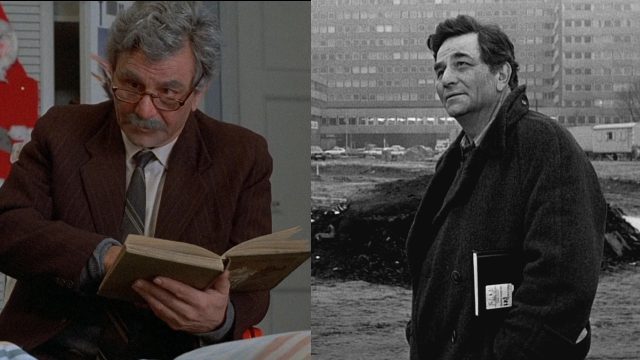Peter Falk was lucky, and gifted, enough to deliver several once-in-a-lifetime performances. A notable internet subculture is hooked on Columbo, his long-running TV show, where he played the titular character: a genial, gentle detective who trapped suspects in webs of their own lies and deceptions. His role in The Princess Bride inspired its own share of quotes and memes, and that’s leaving aside memorable turns in films by Elaine May, John Cassavetes, Frank Capra, and Wim Wenders, or even his dozens of other television roles, including turns in Alfred Hitchcock Presents and Wagon Train.
Falk fit perfectly in dozens of roles, from naturalistic dramas to farce. His breakout film role was as a flint-eyed gangster in 1960’s Murder Inc., but he also played cops, soldiers, and stressed-out spouses. His career had slowed down by the late ’70s, with Columbo ending its initial run in 1978 and Falk only appearing in a handful of roles (including The Great Muppet Caper) before his turn in 1986’s Big Trouble, Cassavetes’ final film.
But that wasn’ the last act for Falk. In 1987 he starred as both a storybook grandpa and a literal (albeit retired) angel. 1987 was a great year for Falk, highlighted by two of his most memorable big-screen appearances, in The Princess Bride and Wings of Desire.
For much of his career, Falk played roles that were simply likable. Columbo might be infuriating if you were an impatient killer just trying to get through your day, but for those of us watching at home, he was funny and kind. His personal warmth usually shone through, for all that he could use it like a weapon to make the viewer let their guard down.
No such finesse is needed for The Princess Bride or Wings of Desire, of course, two roles that take advantage of Falk’s natural warmth and likability. In Wings, Falk ambles genially around Berlin, making pleasant conversation, seeming to find friends wherever he goes, drawing the people and scenes he sees around him with the same kindness and empathy he shows in every conversation. Falk called the part “the craziest thing that I’ve ever been offered,” but there’s no sense of novelty or flippancy in Falk’s performance. He’s an old soul in an old body, still affected by the wonder of humanity and the beauty of the colorful world around him. When we watch Falk as der Filmstar walk past a group of locals who almost recognize him, we see a man at home and at peace.
That sense of peace, along with a deep, empathetic kindness, is most evident in one of the film’s most memorable scenes, when Falk’s character — a retired angel who is otherwise a thinly veiled version of Falk himself — talks with the newly human Damiel about the shock of seeing color for the first time. The scene is quiet and unhurried, and a reevaluation that would have come as a shock in a Hollywood blockbuster is treated with simple matter-of-factness. Falk has been there, and he’s happy to lend a hand to an old colleague taking a similar path. It is as simple and as profound as that.
While not a literal angel, Falk’s grandpa in The Princess Bride has a near-superhuman level of patience with his cranky, sick grandson (though, it should be noted, patience is not the same as passivity — Grandpa gives back as good as he gets). He tells a story of “fencing, fighting, torture, revenge, giants, monsters, chases, escapes, true love, miracles” — and comedy, his wry voice giving shape to the narrative and guiding young viewers through time skips and scene changes. The narration in The Princess Bride frames the story as a fairy tale, which invites the viewer to play along as well. Peter Falk’s Grandfather plays guide to children of all ages, and the deft way he manages his cranky grandson’s commentary and objections allows even the oldest and most cynical viewers to be children again.
The Princess Bride performed only modestly at the box office, but of course has survived as a beloved cult classic; Wings of Desire earned accolades within and outside of Germany (though it was not nominated for an Academy Award; apparently West German films weren’t trendy then). Both movies have lived on far beyond their initial release. (In the US, you can currently watch Wings of Desire on the Criterion Channel and The Princess Bride on Disney+.)
Unfortunately, Falk’s great third act wouldn’t be followed by a fourth. He had more roles, of course, including more Columbo TV movies, an off-Broadway Arthur Miller adaptation, and a trilogy of CBS Christmas movies where he once again played a quirky angel. But by the time his Alzheimer’s diagnosis was officially announced in 2008, he was too sick to work, and he spent most of his remaining years in a conservatorship controlled by his second wife (who refused to share medical information with his children, resulting in a change to California law that was later adopted in fourteen additional states. I’ve heard the cliché that any law named after a person is likely to be a bad idea, but like so much else, I suspect the rules are slightly different in Hollywood). For a long time, his official website stayed live, including many examples of his art.

